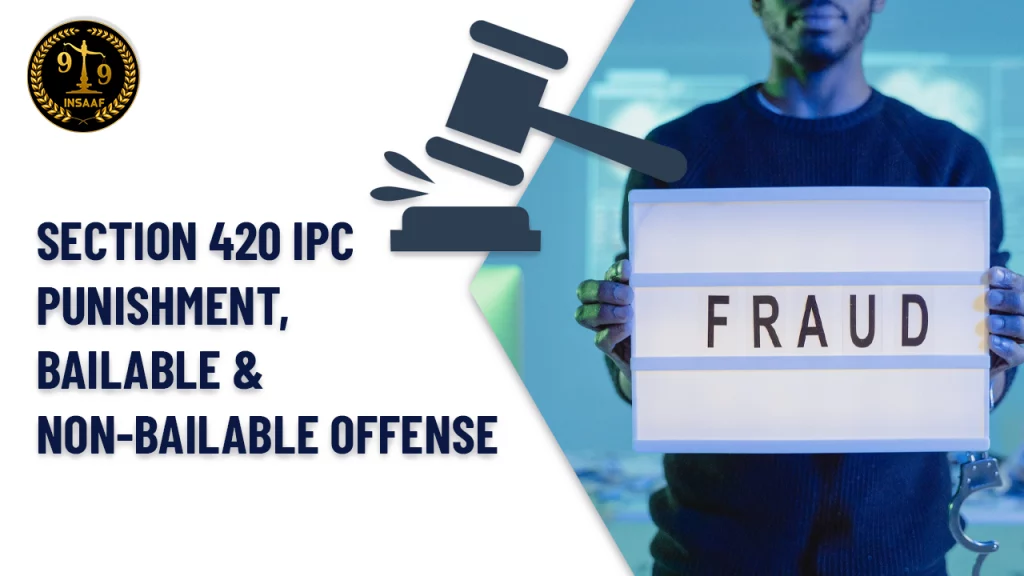

Online Legal Advice from Insaaf99® Online Lawyer Consultation in India


Online Legal Advice from Insaaf99® Online Lawyer Consultation in India

Overview of Section 420 IPC and its Significance in Contemporary Society:
The Indian Penal Code (IPC), specifically Section 420, is a major part of Indian law. The crime of fraudulently influencing the delivery of property is addressed. Today's fast-paced world makes it imperative that you fully grasp this provision, as economic activities are pervasive and digital transactions are standard. The purpose of Section IPC 420 is to prevent acts of fraud that could damage public confidence and the economy. It does more than only prevent people and companies from falling prey to dishonest tactics; it also protects values like fairness and responsibility.
Let us guide you through the intricacies of Section 420 IPC's punishments and bail provisions.
In Section 420 of the Indian Penal Code, cheating is defined as inducing someone to deliver valuable property through deception. A thorough dissection of its legal provisions is essential for understanding its nuances. The crime hinges on three essential elements:
Section 420 IPC defines cheating broadly. It entails lying, hiding important facts, or any other deception. Dishonestly inducing someone is illegal.
However, fraudulent intentions are the reasons underlying deception. The accused must have planned to wrongfully gain or lose. It is crucial to distinguish honest mistakes from purposeful deception. These definitions are the basis for proving an offence under Section 420 of the Indian Penal Code, hence familiarity with them is essential.
Section 420 of the Indian Penal Code establishes a system of penalties designed to account for fraud's varying degrees. This structure incorporates a range of punitive measures, including fines and imprisonment, proportional to the severity of the offence. Unlocking this framework is essential for understanding the repercussions fraudsters may face based on the particulars of their actions.
The dynamic range of penalties within section 420 of the IPC reflects a desire for justice and deterrence. The complexity of fraud necessitates a proportional response that strikes a balance between deterring potential wrongdoers, protecting victims, and preserving societal trust. This framework distinguishes between minor blunders and major deceit, imposing harsher punishments for graver offences and less severe punishments for less damaging actions.
The Fundamental Distinction between Bailable and Non-Bailable offences

Navigating the domain of fraud and deception under Section 420 IPC and its legal complexities requires experience and legal expertise. Understanding the provisions, penalties, and bail considerations of this section enables us to protect ourselves and our transactions. As defenders of openness and honesty, let us remember that legal knowledge is a shield against deceit, compelling us to remain informed, vigilant, and cognizant of our rights and responsibilities in a world where trust is more important than ever.
Insaaf99, an online legal consultation firm, plays a vital role in cases related to Section 420 IPC and beyond. By offering expert legal advice and guidance, Insaaf99 assists individuals and businesses in navigating the complexities of the legal landscape. For those facing accusations or seeking preventive measures, Insaaf99 provides a platform to connect with experienced lawyers well-versed in fraud cases. Through insightful consultations, individuals can better understand their rights, evaluate legal options, and make informed decisions. Insaaf99's commitment to fostering legal awareness equips clients with the knowledge needed to protect themselves from fraudulent situations and uphold the principles of justice.
Also Read